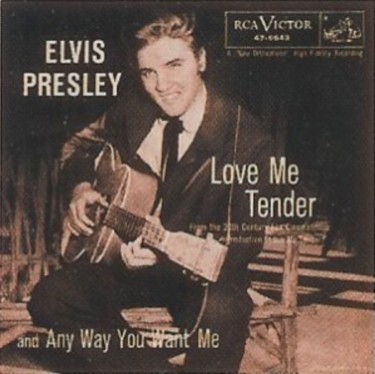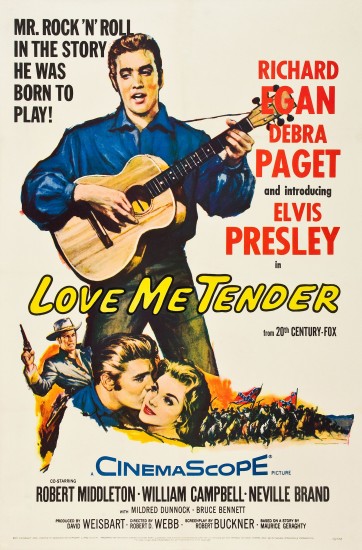Why Did the Writer of “Love Me Tender” Credit His Wife for Writing the Song Instead of Himself?
Here is the latest in a series of examinations into urban legends about music and whether they are true or false. Click here to view an archive of the movie urban legends featured so far.
MUSIC URBAN LEGEND: The person who wrote “Love Me Tender” credited his wife for writing the song as a shot at his “co-writer,” Elvis Presley.
One of the things that Colonel Tom Parker was most famous for was that he made sure to monetize everything that his client, Elvis Presley, did. This was because, as Presley’s manager, he took a very large cut of whatever Elvis made (much larger than most managers, possibly as high as 50% of Elvis’ income towards the end of of Elvis’ career). Therefore, when Elvis made money, Parker made money. So Parker made sure that Elvis made a lot of money. One of the most common ways that Parker would do this is to make sure that any songwriter who wanted Elvis to record their song would have to have the song be published through a publishing company owned by Parker (“publishing rights” are basically half the income of a song, with 50% going to the publisher of the song and 50% going to the songwriter – the publisher then typically pays the songwriter a cut from their half, as well, depending on their contract – sometimes the songwriter publishes their own songs, but that’s rare. “Publishing” a song means the sheet music as well as getting the song played on the radio, etc.). That was normal enough, as most songwriters assign their publishing rights to a publishing company, as most songwriters don’t know how to do the work of selling a song themselves. Parker did a bit more than most people, though, as he maintained multiple publishing companies, mostly as a way to avoid having to ever actually pay people directly. He would instead just form a new publishing company and cut the person he owed money to in as an owner of the new company. Anyhow, like I said, asking a songwriter to assign their publishing rights were normal. Parker, though, also would go even further.
Parker also would try to get songwriters to assign half of their songwriting credit to Elvis Presley, as well. Normally even when you assign your publishing rights, songwriters are protected via owning the copyright on the song, so they get at least half of the income of the song no matter what. However, Parker’s theory was that the songwriter would make more money getting half of the songwriting credit of a song by Elvis Presley than they would if they owned all of the songwriting credit of a song performed by someone else. After all, when Parker was really pushing this approach during the 1950s, Elvis really was the king of Rock ‘n’ Roll. For his part, Elvis never tried to actually claim that he co-wrote these songs, he just acknowledged that it was something Parker set up for them to make more money (although, it is fair to say that Elvis would often play a major role in the arrangement of songs when it actually came time to record the song, so it wasn’t like Elvis was just showing up, singing the song and then collecting a paycheck – he did intensive work on all of the songs that he recorded).
One of the most famous songs done under this system was the 1956 classic, “Love Me Tender”…
which debuted in the film of the same name…
The song was written by longtime film composer and arranger Ken Darby (who used the melody of an old Civil War song, “Aura Lee,” which had gone into the public domain). However, it was credited not to Darby, but to Elvis Presley and Vera Matson – the maiden name of Darby’s wife. Why did he not credit himself for the song? Read on to find out!
As it turned out, Darby wasn’t exactly a fan of the deal that he was pressured to make. It made financial sense, of course, as the song went on to become a classic, appearing in dozens of films and television shows and selling over three million copies as a single (not to mention all the radio airplay over the years). However, it is still a bit galling to say that another guy wrote your song. That, as it turned out, was the impetus for Darby just taking his name off of the song entirely. He credited his wife as a bit of a snarky commentary on Elvis’ credit, noting that he gave her credit because “she didn’t write the song either.”
Zing!
As it turned out, Parker’s insistence on Elvis getting co-writer status on songs led to songwriters ultimately choosing not to give their songs to Elvis in the future, especially as other artists emerged as competitors. Later in his career, Elvis would do new versions of older song or religious songs that were in the public domain, like “How Great Thou Art.” Elvis even ended up actually writing a couple of songs himself later in his career.
Anyhow, the legend is…
STATUS: True
Feel free (heck, I implore you!) to write in with your suggestions for future urban legends columns! My e-mail address is bcronin@legendsrevealed.com







